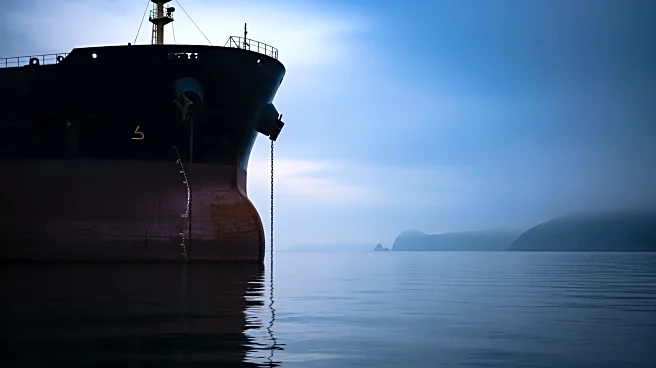What's Happening?
Iran has confirmed the seizure of a Marshall Islands-flagged oil tanker, identified as the Talara, in the Strait of Hormuz. The Revolutionary Guard stated that the tanker was intercepted due to carrying
an illegal consignment, although details on the consignment and the crew were not disclosed. The vessel, carrying 30,000 tons of petrochemical products, was en route to Singapore when it was redirected to Iranian waters following a court order. The incident was observed by a U.S. Navy MQ-4C Triton drone, and a private security firm reported the involvement of three small boats in the seizure. The British military acknowledged the incident, suggesting state activity forced the tanker into Iranian territorial waters. Columbia Shipmanagement, the company managing the tanker, has lost contact with the vessel and is working with maritime security agencies to ensure the crew's safety.
Why It's Important?
The seizure of the oil tanker highlights ongoing tensions in the region, particularly between Iran and Western nations. The Strait of Hormuz is a critical chokepoint for global oil trade, with 20% of all oil traded passing through it. Iran's actions could disrupt international shipping routes and exacerbate geopolitical tensions, especially following a recent 12-day war involving Iran and Israel. The incident underscores the fragile security environment in the Middle East, where maritime security is crucial for global energy markets. The U.S. Navy's presence in the region aims to maintain open waterways, but Iran's threats to close the Strait of Hormuz pose significant risks to international trade and energy security.
What's Next?
The situation may lead to increased military and diplomatic efforts to ensure the safety of shipping routes in the region. The U.S. and its allies might enhance their naval presence to deter further Iranian actions. Additionally, diplomatic channels could be pursued to resolve the situation and prevent escalation. The incident may also prompt discussions on international maritime security protocols and the enforcement of legal measures to protect commercial vessels. Stakeholders, including shipping companies and oil traders, will closely monitor developments to assess potential impacts on global oil supply and prices.
Beyond the Headlines
The seizure reflects broader geopolitical dynamics, including Iran's response to Western sanctions and its strategic use of maritime control as leverage. The incident may influence future negotiations on Iran's nuclear program and regional security arrangements. It also raises ethical questions about the use of military force in international waters and the protection of civilian maritime operations. Long-term implications could include shifts in global energy strategies, with countries seeking alternative routes or sources to mitigate risks associated with the Strait of Hormuz.









